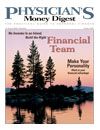Modify a Portfolio with Convertible Bonds
Convertible bonds have been the focus ofnumerous articles and commentary from thefinancial press over the past several months.But what exactly are they? Are they useful investmentsfor the individual physician-investor?
Making a Safe Bond Bet
A convertible bond is a bond issued by a publiclytraded corporation that gives the bondholder theoption to convert the bond to a certain number ofshares of the corporation's common stock at a specificprice. Because you receive this option to purchasestock, the yield that you get on your bond will belower than the yield on a regular bond of equal qualityand maturity. Convertible bondholders are essentiallycreditors of the issuing company who have theright to become bond owners.
Convertible bonds are not a new investment product.They became popular in the latter part of the19th century when the railroad and telephone companiesused them as a means of financing theirexpansion. Some of their advantages include the abilityto capture additional profits should the stockprice rise above the conversion price. If the stockdoes poorly, you have the safety of owning a bondand collecting interest. As with all financial products,advantages come at a price. You will receive a loweryield than you would for a comparable nonconvertiblebond, so if you never convert to shares of stock,you have earned a subpar return. Also, most convertiblebonds are callable at the option of the issuingcompany at a price that effectively limits profitpotential should the stock price rise significantly.
Managed Chicken Stocks
Analyzing which convertible bonds to purchase is adaunting task for most physician-investors since itrequires an in-depth understanding of bonds, stocks,and corporate analysis. Your best bet is a convertiblebond fund run by an experienced manager. Considerno-load Vanguard Convertible Securities (VCVSX)run by manager Larry Keele, whose fund has earned a10.3% annualized return over the past 3 years.Convertible bond pioneer John Calamos, along withNick Calamos, manage the Calamos Growth and Incomefund (CVTRX), which allocates approximately58% to convertible bonds with the remainder investedin stocks. This load fund, which earned 10.68%annualized over the past 3 years, can be purchased ona no-load basis through Charles Schwab & Company.
Are convertible bonds an appropriate investmentfor the individual investor? Sometimes referred toas "chicken stocks," convertible bonds can providerisk-averse physician-investors a way to participatein the volatile stock market while reducing risk. Youare effectively combining the upside potential ofowning stocks with the stabilizing effect of owningbonds. An added benefit is that convertible bonds arenot directly correlated with either bonds or stocks,thus adding to the overall diversification of yourportfolio. From an asset allocation perspective, theyshould be included as part of your fixed-income allocation,rather than your equity allocation. Convertiblebonds are not for everybody, but they are avaluable investment tool to consider.
Stewart H.Welch III, CFP
®, AEP, is the founder of the Welch Group,
LLC, which specializes in providing fee-only wealth management
services to affluent retirees and health care professionals
throughout the United States. He is the coauthor of J.K. Lasser's
New Rules for Estate and Tax Planning (John Wiley & Sons, Inc;
2001). He welcomes questions or comments at 800-709-7100 or visit
www.welchgroup.com. This article was reprinted with permission from the
Birmingham Post Herald.
